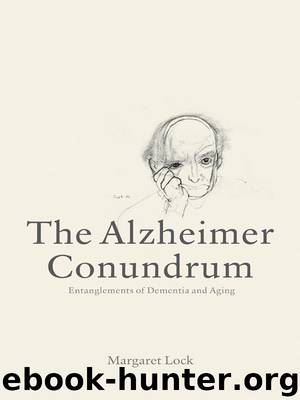The Alzheimer Conundrum by Lock Margaret;

Author:Lock, Margaret;
Language: eng
Format: epub
Publisher: Princeton University Press
Published: 2013-11-18T16:00:00+00:00
Raising the GWAS Stakes
In November 2009 Rudolph Tanzi, the Harvard neuroscientist, participated in an event at Capitol Hill together with Francis Collins, the director of the National Institutes of Health. These scientists, both billed on the Internet as rock stars of science, joined up with Aerosmith’s Joe Perry and together they played a rendition of “The Times They Are a-Changin’ ” in which the second verse was liberally adapted to direct the attention of Congress to the urgent need for more funding for Alzheimer disease. Joe Perry performed “unplugged,” Collins was the lead guitar, and Tanzi played the harmonica, an ensemble strikingly portrayed in a poster to commemorate the event. A line appears on the video informing viewers that the sponsors of the event were the pharmaceutical companies Wyeth and Elan. In an accompanying interview conducted on the steps of Capitol Hill, Tanzi, who is an excellent guitar player, informs everyone that he has been an Aerosmith fan since he was 16 years old and adds that Joe Perry and he are in agreement that what is needed in both science and music is “novel thinking; thinking outside the black box.” Tanzi then puts in a serious plug for Alzheimer funding (which is why he takes time out from his lab to participate in a performance such as this) noting that at present only $400 million a year is spent on AD—a drop in the bucket, as he describes it.19 A 2012 request sent to the U.S. government is for funding to a level of $2 billion per year.20
I met Rudy Tanzi in his Harvard office attached to his laboratory facilities in early 2010. Tanzi, grinning, started out by stating,
[W]e are sadomasochists here, we don’t believe in using core facilities and outsourcing, we do everything ourselves because then you can really trust it. Our GWAS is family-based and we used four different samples of over 1,300 families.
GWAS is telling us we have—if you take it at face value—just looking at the SNPs, many AD candidate genes that are common variants exerting tiny effects on risk. Is that what AD is? Well, it fits very nicely with a model I helped propagate in ’99: common variant-common disease, rare mutation-rare disease. But that’s in question now. Here’s the thing: penetrance and prevalence affect what determines the effect of a gene—right? Penetrance means the chance of getting the disease when you inherit a mutation or a variant. Prevalence is the percentage of the population or patients carrying it [the mutation or variant]. And for early onset AD it looks like this: heavy weighting on penetrance and low on prevalence—rare mutations, full penetrance, in effect. APOE looks like heavy prevalence with moderate penetrance, and with GWAS what we are getting is huge prevalence, tiny penetrance—if you take them at face value.
When I asked if the GWAS genes found thus far work in consort, Tanzi said,
They probably all work in consort with each other, but it’s difficult to do gene, to gene, to gene, to gene, to gene, to gene interaction studies.
Download
This site does not store any files on its server. We only index and link to content provided by other sites. Please contact the content providers to delete copyright contents if any and email us, we'll remove relevant links or contents immediately.
| Administration & Medicine Economics | Allied Health Professions |
| Basic Sciences | Dentistry |
| History | Medical Informatics |
| Medicine | Nursing |
| Pharmacology | Psychology |
| Research | Veterinary Medicine |
Periodization Training for Sports by Tudor Bompa(8051)
Why We Sleep: Unlocking the Power of Sleep and Dreams by Matthew Walker(6500)
Paper Towns by Green John(4956)
The Immortal Life of Henrietta Lacks by Rebecca Skloot(4390)
The Sports Rules Book by Human Kinetics(4179)
Dynamic Alignment Through Imagery by Eric Franklin(4022)
ACSM's Complete Guide to Fitness & Health by ACSM(3912)
Kaplan MCAT Organic Chemistry Review: Created for MCAT 2015 (Kaplan Test Prep) by Kaplan(3877)
Introduction to Kinesiology by Shirl J. Hoffman(3675)
Livewired by David Eagleman(3595)
The River of Consciousness by Oliver Sacks(3480)
The Death of the Heart by Elizabeth Bowen(3442)
Alchemy and Alchemists by C. J. S. Thompson(3388)
Bad Pharma by Ben Goldacre(3177)
Descartes' Error by Antonio Damasio(3177)
The Emperor of All Maladies: A Biography of Cancer by Siddhartha Mukherjee(2994)
The Gene: An Intimate History by Siddhartha Mukherjee(2990)
The Fate of Rome: Climate, Disease, and the End of an Empire (The Princeton History of the Ancient World) by Kyle Harper(2955)
Kaplan MCAT Behavioral Sciences Review: Created for MCAT 2015 (Kaplan Test Prep) by Kaplan(2878)
